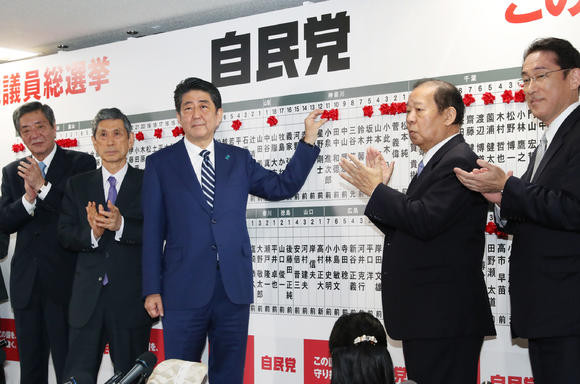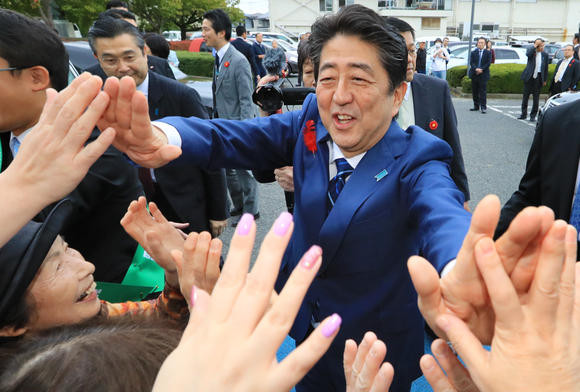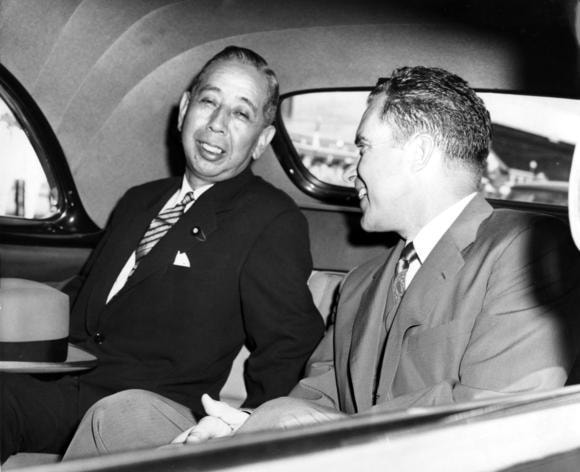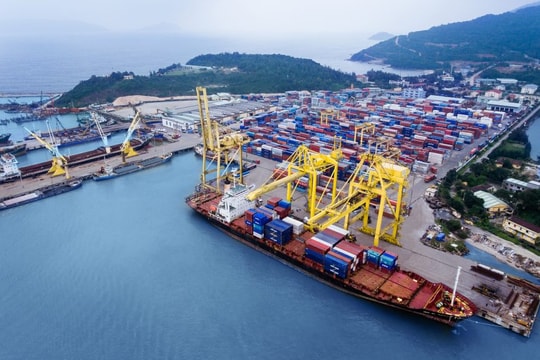Prime Minister Abe's ambition to bring Japan back to 'normal'
(Baonghean)- Far surpassing its rivals in the October 22 election, Prime Minister Shinzo Abe's ruling coalition won a resounding victory. This means that the test of people's trust in Prime Minister Abe's government has been successful. However, the road ahead will still be full of challenges for Prime Minister Abe to develop and "return to normal".
The victory was not unexpected.
According to the official results, Prime Minister Abe's Liberal Democratic Party (LDP) won 283 seats, far exceeding the 233-seat majority target that Mr. Abe set in his election program. With this foundation, the LDP will likely control all legislative committees in the House of Representatives. The Komeito Party in the ruling coalition won 29 seats. Thus, the ruling coalition won a total of 312 seats out of 465 seats in the House of Representatives, exceeding the two-thirds majority needed to easily pass government decisions. There are two reasons to explain the resounding victory of Prime Minister Abe's Liberal Democratic Party coalition.
 |
| Japan's ruling coalition wins landslide victory. Photo: Nikkei |
First, the opposition parties are deeply divided internally over their platforms and policies. The Party of Hope, one of the two main opposition parties before the election, has suffered a rapid decline in popularity in a short period of time due to its unclear platform, although its chairwoman, Yuriko Koike, who is also the Governor of Tokyo, was expected to change the balance of power in the Lower House election.
However, the time was too urgent, from when Ms. Koike announced the establishment of the Party to the election was less than 1 month. Many of the policies of this Party are said to overlap with Prime Minister Abe's LDP. Therefore, compared to the LDP, the Party of Hope is considered a "childish repetition". The opposition Democratic Party is also in internal turmoil, not ready for the election because many members have left the ranks. Obviously, the crisis of the opposition has become a clear advantage of the LDP.
Second, from the voters' perspective, the current government is the most viable option in the context of Japan facing many concerns. In recent times, the administration of Prime Minister Shinzo Abe has demonstrated its ability to handle crisis situations when the threat from North Korea is increasing. This is a situation where a young, inexperienced political party can easily fall into a passive position. In addition, in terms of economy, the "Abenomic" policy, although not a great success, has brought bright colors to the economic picture of Japan.
Growth for 6 consecutive quarters, unemployment rate dropped from 4% to 2.8%, Tokyo stock market, considered a symbol of the economy, continuously had positive movements. All thanks to the efforts to revive the economy of Prime Minister Shinzo Abe. In other words, the victory of the ruling coalition is not too surprising. This victory will be a launching pad and guarantee for Mr. Abe to protect his position as president of the LDP.
A busy agenda
Despite the landslide victory in this election, the road ahead for the ruling coalition and Prime Minister Abe himself is not necessarily smooth. Mr. Abe's approval rating fell to 38% in a survey conducted by the Asahi newspaper last month, much lower than 54% at the beginning of the year. That means Japanese voters expect more from Prime Minister Shinzo Abe.
The people of the Land of the Rising Sun cannot rest assured when North Korean leader Kim Jong-un threatens to sink Japan into the sea and has twice launched missiles over the country's territory. Regarding domestic issues, the demographic "bomb" is affecting all areas from the economy to society in the country.
A low birth rate and a growing elderly population mean a shrinking workforce and huge welfare costs. Japan’s public debt is the highest in the industrialized world, more than twice the size of its economy. Experts have long warned that Tokyo must reduce its debt mountain or risk default.
 |
| Prime Minister Shinzo Abe and supporters in Iwate Prefecture. Photo: Nikkei |
Because of these “obvious” challenges, in the press conference on the afternoon of October 23, Mr. Abe announced that by the end of 2017, the LDP will build a policy package to improve urgent problems such as low birth rate and aging population by promoting a more effective social welfare system for the younger generation. The Japanese Prime Minister also pledged to increase the consumption tax from the current 8% to 10% from October 2019, to strengthen social welfare and allow safe nuclear power plants to operate again.
In terms of foreign affairs, Prime Minister Abe pledged that Japan would coordinate with the US, China and Russia in efforts to contain North Korea's nuclear threat through "strong and firm diplomatic measures". In the immediate future, Japan will pursue a strong diplomatic line and put greater pressure on North Korea to soon abandon its nuclear missile development program.
Opportunity to amend the Constitution
“Abe wants to leave his name in history by achieving something great like his grandfather did,” said Tataoki Nogami, a former journalist and author of three books on Prime Minister Abe. Abe’s grandfather, former Prime Minister Nobusuke Kishi, is known for revising the US-Japan security treaty into one of equal partnership in 1960. Before the revision, the US was allowed to use military facilities in Japan, but was not obliged to defend its ally.
Prime Minister Abe “followed” his predecessor and grandfather in becoming a reformer of national security policy when he passed the defense law in 2015. The legalization of the right to self-defense has allowed Japan to have a more balanced role in its security partnership with the United States.
 |
Prime Minister Nobusuke Kishi, Prime Minister Shinzo Abe's grandfather (right) during a meeting with US Vice President Richard Nixon in 1957. AP photo. |
The victory in the recent important election will continue to pave the way for Prime Minister Abe to amend the Constitution. The focus of Prime Minister Abe's draft of the Constitution is encapsulated in the phrase "becoming a normal country", a country with a regular military, not a defense force, and able to wage war. Currently, under the Peace Constitution, Japan cannot have armed forces, except for national defense.
If successful, Mr. Abe could become the first prime minister to amend the post-war constitution. According to many observers, along with other economic and social issues, amending the constitution will once again dominate the Japanese government's agenda in 2018. However, to achieve his goal, Prime Minister Abe will have to overcome many challenges because the views of some opposition politicians still oppose amending the Constitution. The results of a recent survey by the Asahi newspaper showed that about 37% of respondents supported him while 40% opposed.
Obviously, although Japanese Prime Minister Abe's ruling coalition won a resounding victory, it will also have to face many domestic and foreign challenges in the coming time.
Thanh Huyen
| RELATED NEWS |
|---|








